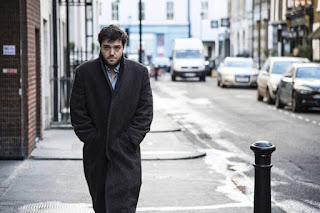EDUCATING GREATER
MANCHESTER: Thursday,
Channel 4
FESTIVAL TALES:
EDINBURGH AT 70: Saturday,
BBC Two
STRIKE – THE CUCKOO’S
CALLING: Sunday
and Monday, BBC One
If
there’s a more heart-warming show on TV than the award-winning ‘Educating…’ franchise, I’ve yet to find
it. I probably couldn't cope if I did.
The
latest iteration of this observational documentary series is EDUCATING GREATER MANCHESTER, which
follows the usual winning formula of tracing everyday life in a secondary
school full of dedicated teachers and pupils struggling with various sensitive
issues.
Episode
one focused on the subject of racial integration. Its quiet star was Rani, a Syrian
refugee. Rani arrived in Manchester last year and found it hard to make
friends. Gradually, with assistance from the staff, we saw him assimilating
into this concrete microcosm of multicultural society.
Highlights
included a nice wee white lad named Jack befriending Rani in the playground, an
older Syrian boy serving as his benign protector, and the literally symbolic
sight of him becoming fully integrated by joining a group of friends in that
time-honoured ritual of drawing rude illustrations on a dusty van.
The
theme of racial and religious sensitivity was starkly compounded by the terrorist attack at
the Ariana Grande concert, which occurred during the making of this series.
We
witnessed emotional testimonies from pupils who were at the Manchester Arena
that night, and followed the concerned staff as they tried to ensure that the
tragedy didn’t inflame tensions among their pupils. Thankfully, it didn’t. Kids
are generally better than that.
As
trite as this may sound, Jack’s mum inviting Rani over for tea just days after
the attack spoke volumes about the essential decency and resilience of ordinary
human beings. By the end of the episode, the boys were proclaiming friendship
for life.
In
lesser hands, this carefully structured uplifting narrative could’ve come
across as crassly contrived and manipulative. But the makers of ‘Educating…’ aren’t cynical in the
slightest, their sincerity is palpable. That’s why it works so beautifully.
The
Edinburgh Festival/Fringe is the world’s greatest arts hoedown. It turned 70
this year, but where did it come from? How did it grow into the sprawling
behemoth we know and love today?
Jack
Whitehall, just one of the countless comedians who made their name at the
Fringe, found out in FESTIVAL TALES:
EDINBURGH AT 70, a solid documentary celebrating its eventful story,
frequent controversies and eclectic spirit.
It
was the brainchild of Rudolf Bing, an Austrian Jew with a profound belief in
the power of art to bring light in times of darkness. This, after all, was
1947. That he strove to encourage a global healing process in conservative
post-war Edinburgh – a dour town without an opera house or gallery of modern art to its name - turned out to be an eccentric masterstroke.
With
assistance from esteemed Fringe veterans such as Claire Bloom, Stephen Fry and Michael
Palin, Whitehall roamed the venues, alleyways and toilets of Edinburgh,
sainted, scented venues which have played host to everyone from Richard Burton
and Maria Callas, to Jerry Sadowitz and Puppetry of the Penis.
I doubt that, as a reviewer, I'll ever go through the lonesome, stressful hell of attending the Fringe again. But this fond tribute did serve as a reminder of why it's such an important, freewheeling nightmare.
Former
Edinburgh resident J.K. Rowling wrote the Cormoran Strike mystery novels, for
adults, using her Robert Galbraith pseudonym. STRIKE – THE CUCKOO’S CALLING is the first TV adaptation of this
functional set of sleuth-driven dramas.
Like
most police procedurals, it’s inoffensively adequate in its time-passing way. But,
as a species, do we really need to witness another disheveled detective
solving made-up crimes on a Sunday night? Strike is a boring character. Why
should anyone care?



No comments:
Post a Comment